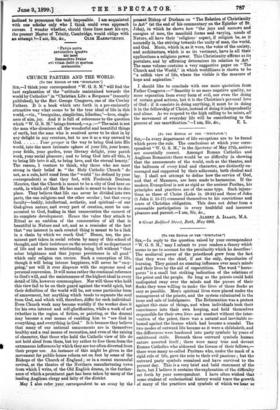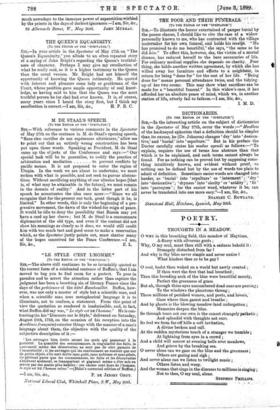rro THE EDITOR OP THE "SPECTATOR."] SIR,—In reply to the
question raised by your correspondent "W. G. S. M.," may I submit to your readers a theory which seems to me to account for the peculiarity which he describes The mediaeval power of the priesthood grew from the fact that they were the chief, if not the only, depositaries of learning. They gained an amazing influence over men's minds and their lives by the aid of superstition. The word " hocus- pocus" is a small but striking indication of the relations of the priest and the people. So long as the priests could hold undisputed sway over the minds and the purses of their flocks they were willing to make the lives of those flocks as easy as possible. Men's spiritual lives were placed under the management of the priests, and the system culminated in the issue and sale of indulgences. The Reformation was a protest against this state of things, and when individuals took their consciences into their own keeping, and held themselves responsible for their own lives and conduct without the inter- vention of the priest, there was a natural and inevitable re- bound against the license which had become a scandal. The two modes of outward lite became as it were a shibboleth, and the differences were hardened into party symbols by years of embittered strife. Beneath these outward symbols human nature asserted itself ; there were many true and devout Roman Catholics who abhorred the license of their fellows,— there were many so-called Puritans who, under the mask of a rigid rule of life, gave the rein to their evil passions ; but the outward party symbols remained and have survived to the present day. This is a very brief and bald statement of the facts, but I believe it contains the explanation of the difficulty set forth by your correspondent. I have often wished that some student of ecclesiastical history would trace the growth of many of the practices and symbols of which we hear so much mowadays to the immense power of suPerstitiorrwielded by the priests in the days of darkest ignorance.—I am, Sir, dc., 50 Albemarle Street, W., May 30th. Joliti







































 Previous page
Previous page